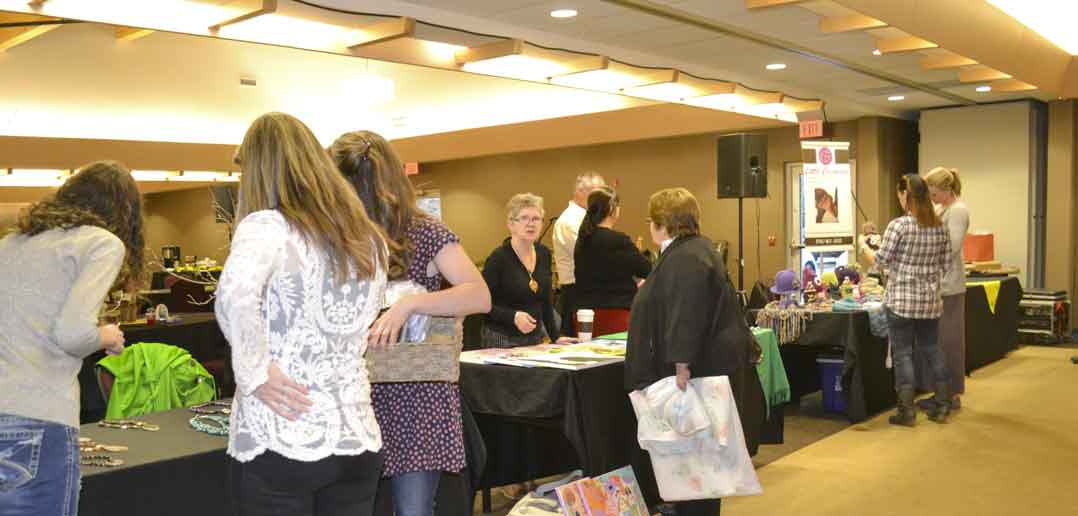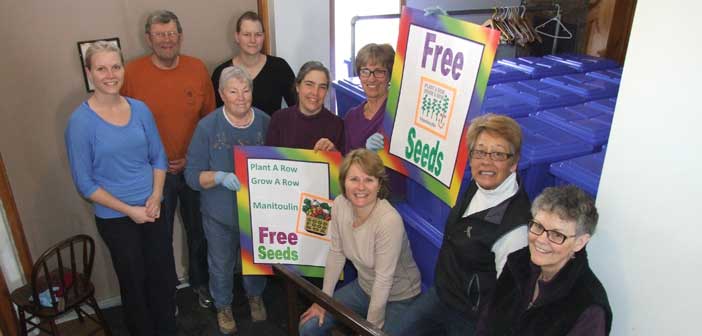Three-year event focuses on raising awareness and taking action
LITTLE CURRENT—The annual Northern Victim Services Conference was hosted by the Manitoulin Northshore Victim Services at the Manitoulin Hotel and Conference Centre in Little Current earlier this month. With a focus on raising awareness and taking action, the three-day conference brought together individuals from Wawa, Temiskaming, Moose Factory, North Bay, the North Shore and Manitoulin.
“The overall conference was pretty amazing,” Victim Services Program Coordinator Kristin Bickell told The Expositor following the weekend. “The workshop and training portions of the conference on Friday and Sunday for Victim Services volunteers were well attended, while we had over 80 individuals attend the Saturday seminars that were open to the public.”
Ms. Bickell said she had received great feedback from participants from all portions of the conference and that everyone was particularly impressed with Saturday’s keynote speakers.
Manitoulin Northshore Victim Services Board Chair Patricia Giroux explained to the attendees on Saturday that the conference was being held during National Victims of Crime Awareness Week, the goal of which is to raise awareness about issues facing victims of crime and the services, programs and laws in place to help victims and their families.
“The theme for this year’s conference is ‘taking action’ and each of our presenters have taken action in their own ways to make a difference,” said Ms. Giroux, prior to opening the floor to the first speaker, Julie Lalonde.
[pullquote]“The theme for this year’s conference is ‘taking action’ and each of our presenters have taken action in their own ways to make a difference,” said Ms. Giroux, prior to opening the floor to the first speaker, Julie Lalonde.[/pullquote]
Originally from Kagawong, Ms. Lalonde is now an award-winning social justice advocate based in Ottawa. She is also the current project manager of Draw-the-line.ca, a provincial anti-sexual violence campaign that targets bystanders, about which she delivered a service provider workshop on Sunday morning.
As well, Ms. Lalonde is the director and founder of the first Canadian chapter of Hollaback!, an organization dedicated to ending all forms of street harassment, and the co-founder of the Coalition for a Carleton Sexual Assault Centre.
Her presentation entitled ‘Not My Business: Sexual Violence and Bystanders Intervention’ focussed on bridging the gap between theory and practice in order to make activism relevant and accessible.
Not only was Ms. Lalonde’s presentation informative, she also delivered it using a frank and, at times, humorous approach which kept the audience engaged and receptive.
“My goal today is to debunk some of the myths around sexual violence and the elements that prevent people from intervening,” explained Ms. Lalonde.
“The bystander effect is a term that originally came out of the medical community and it occurs when the presence of others hinders an individual from intervening in an emergency situation,” continued Ms. Lalonde, giving the example of a woman who was violently raped and murdered in an alleyway in New York, witnessed by 20 individuals who did nothing.
Asking for feedback from the audience, she identified the impacts of an individual not intervening when witnessing an act of sexual violence and the different forms that intervening could mean from calling the police to distracting the perpetrator or speaking up, depending on the situation.
“On average, by the time a perpetrator (of sexual violence) is first apprehended they have engaged in similar crimes six to seven times previously,” said Ms. Lalonde.
She said that sexual violence is being perpetuated by ‘rape culture’—the idea that the prevalent attitude and practices of society are normalizing sexual violence.
“We presently live in a culture that teaches women not to get raped opposed to teaching men not to rape,” she added, noting recent University of Ottawa scandals including a social media rape threat and accusations of the hockey team engaging in sexual violence.
As Ms. Lalonde’s presentation continued she identified several reasons that individuals commonly give for not intervening when they witness an act of sexual violence and attempted to “debunk the myths” around intervening.
“I took to social media and asked this question and one of the most common answers was ‘it’s awkward,’” Ms. Lalonde shared. “It may be awkward if you’re wrong, but it would be a lot more ‘awkward’ if you learn something happened and you could have done something to stop it.”
“People also said ‘what if it comes back on me’ either socially or physically,” she continued. “As I’ve discussed a bit already, there are different ways to intervene and it can be a simple as calling the police or just checking in to make sure the potential victim is okay.”
She said another excuse that she heard was ‘I don’t know what sexual violence looks like.’
“People think that sexual violence is just rape, but the Criminal Code of Canada defines sexual violence as an assault of a sexual nature that violates the sexual integrity of the victim,” Ms. Lalonde added. “And sexual violence exists on a continuum, not a hierarchy.”
“Another common reason people give (for not intervening) is ‘drunk chicks are asking for it’,” said Ms. Lalonde. “This is an example of victim blaming—we have created a culture where we question the victim of sexual assault, not the perpetrator. You can’t drive when you are impaired or get a tattoo, so how could you consult to sex?”
“Julie’s presentation was really amazing,” said Ms. Bickell following the presentation. “She has such great energy and really engaged the audience.”
In the afternoon Heather Imming gave a presentation titled ‘There is Light at the End of the Tunnel,’ speaking about her personal experience, her work with and on behalf of people who have been victimized.
“Heather silenced the room,” Ms. Bickell told The Expositor. “She was so honest and brave—it was remarkable how she survived such a traumatic experience and went on to have such an amazing attitude.”
Ms. Imming was a subcontracts manager working in the aerospace industry before a series of brutal attacks by her estranged husband changed her life forever. Ms. Imming went on to assist the courts in having her abuser declared a dangerous offender, the first case in Canada where the dangerous offender legislation was applied strictly on the basis of violence against women.
She is now an advocate and educator on issues of violence against women and the founder of Share Our Strength.




